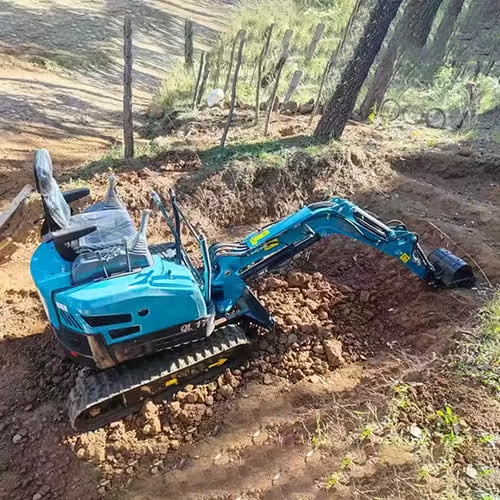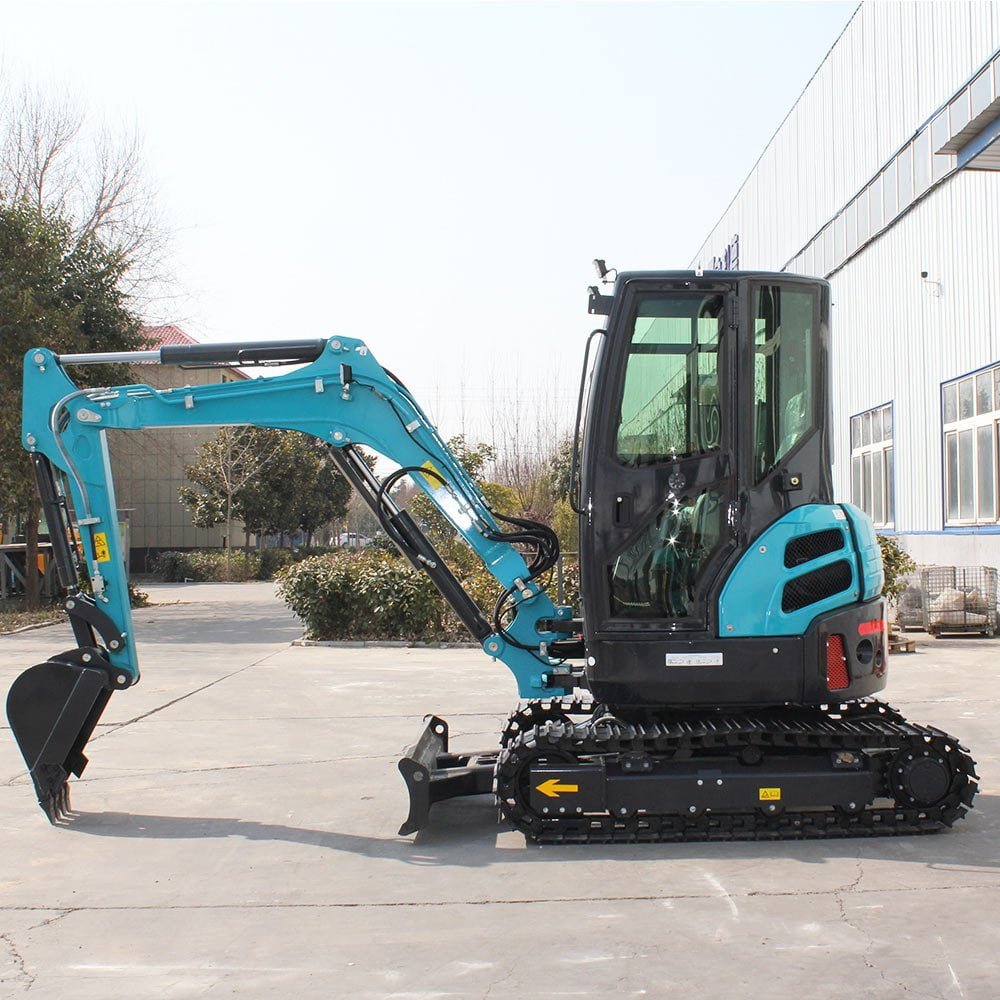Excavators, with their sheer power and functionality, play a pivotal role in the construction and earthmoving industries. Among these giants of machinery, the 3.5-ton excavator stands as a remarkable unit, embodying a blend of power, efficiency, and versatility.
Introduction to 3.5 Ton Excavators

When it comes to heavy-duty machinery in construction and earthmoving, 3.5-ton excavators stand out as vital players. These machines embody a perfect blend of power, precision, and versatility within the construction industry. With their compact yet robust build, 3.5-ton excavators offer an ideal balance between strength and agility, making them essential for a wide array of projects.
Key Features of a 3.5 Ton Excavator
The 3.5-ton excavator boasts several standout features that define its efficiency and utility. Its compact size allows it to access confined spaces with ease, making it invaluable for projects where maneuverability is crucial. Despite its smaller stature, this excavator doesn’t compromise on power. Its engine delivers impressive strength, ensuring it can handle a variety of tasks efficiently.
Moreover, the digging depth and bucket capacity of a 3.5-ton excavator are notable. These specifications enable it to tackle excavation and earthmoving tasks effectively, whether it’s digging trenches or loading materials. This combination of size, engine power, and digging capabilities makes the 3.5-ton excavator a versatile and indispensable machine on construction sites.
| Key Features of a 3.5 Ton Excavator |
|---|
| Compact Size: Allows access to confined spaces |
| Engine Power: Impressive strength for various tasks |
| Digging Depth and Bucket Capacity: Efficient excavation capabilities |
| Maneuverability: Navigates through tight spaces with agility |
| Versatility: Suitable for construction, landscaping, and utility projects |
| Balance of Power and Size: Ideal mix for diverse job sites |
| Cost-effectiveness: Efficient performance without excessive operational costs |
Applications and Uses
The 3.5-ton excavator finds extensive application across diverse industries and projects due to its versatility and efficiency. In the construction sector, it maneuvers adeptly through tight spaces, proving invaluable for tasks such as digging foundations, trenching, and site preparation. Its compact size allows it to navigate urban construction sites where larger equipment might struggle.
Furthermore, in landscaping and earthmoving tasks, the 3.5-ton excavator showcases its finesse. It’s adept at tasks like grading, digging ponds, and clearing land, offering precision and power simultaneously. Additionally, in utility and infrastructure projects, this excavator proves its worth by efficiently handling tasks like laying pipes, excavating for utility lines, and other vital groundwork.
The adaptability of the 3.5-ton excavator across these various applications underscores its significance in a multitude of industries, making it a cornerstone in construction, landscaping, and utility projects alike.
Advantages Over Other Sizes
The 3.5-ton excavator presents a unique balance between power and size, offering several advantages over both larger and smaller counterparts. Its compact size grants it exceptional maneuverability, allowing access to confined spaces that might be inaccessible to larger excavators. This agility proves vital in urban construction sites or projects with limited workspace.
Compared to smaller excavators, the 3.5-ton variant possesses greater power and digging capabilities without being as cumbersome as larger models. It strikes a sweet spot, offering sufficient strength to handle moderately heavy tasks while still maintaining a level of versatility that larger machines might lack. This versatility makes it an ideal choice for a wide range of projects, combining power with maneuverability.
Additionally, the cost-effectiveness of the 3.5-ton excavator in operations shouldn’t be overlooked. It strikes a balance between performance and operational costs, making it an attractive choice for many construction companies. Overall, its adaptability, power, and cost efficiency make the 3.5-ton excavator a popular and practical choice across various job sites.
Technology and Innovations
Recent years have witnessed remarkable advancements in the technology powering 3.5-ton excavators, transforming these machines into highly efficient and sophisticated tools. One significant area of advancement lies within hydraulic systems. These systems have undergone substantial improvements, resulting in smoother and more precise operations. Enhanced hydraulics contribute to better control and efficiency in various tasks, from digging to lifting heavy loads.
Moreover, the integration of telematics and automation has revolutionized the way these excavators operate. Telematics systems provide real-time data on machine performance, fuel usage, and maintenance needs. Automation features, such as automatic idling and improved control systems, streamline operations and enhance overall productivity while reducing operator fatigue.
Safety features have also seen significant upgrades. Modern 3.5-ton excavators come equipped with advanced safety technologies like proximity sensors, cameras, and alarms to alert operators of potential hazards, thereby minimizing accidents and ensuring a safer working environment.
These technological advancements continue to elevate the efficiency, safety, and precision of 3.5-ton excavators, making them not just powerful machines but also smarter and safer tools for construction and earthmoving tasks.
Maintenance and Longevity

Maintaining a 3.5-ton excavator is pivotal for ensuring its longevity and optimal performance throughout its lifespan. Regular and comprehensive maintenance routines play a crucial role in preserving the efficiency and functionality of these powerful machines.
Routine checks and servicing of vital components such as fluids, filters, hydraulic systems, and undercarriage are essential. Following manufacturer-recommended maintenance schedules for oil changes, filter replacements, and inspections is imperative to prevent premature wear and tear.
Moreover, adherence to proper operating practices and guidelines significantly contributes to the excavator’s longevity. Ensuring that operators are trained and knowledgeable about the machine’s capabilities and limitations reduces the risk of unnecessary strain or damage.
Additionally, proactive measures such as promptly addressing any signs of wear, addressing minor issues before they escalate, and conducting thorough inspections after demanding tasks can extend the lifespan of the excavator. By investing in regular maintenance and adopting proactive measures, owners can maximize the durability, reliability, and performance of their 3.5-ton excavators, ultimately reducing long-term operational costs.
Market Trends and Future Prospects
The market for 3.5-ton excavators is witnessing a steady rise, driven by various factors that underscore their significance in multiple industries. Their versatility, striking a balance between power and maneuverability, has positioned them as indispensable assets across construction, landscaping, and utility projects.
One notable trend shaping the future of these excavators is the increasing demand for smarter, more technologically advanced machines. Forecasts suggest a continued integration of smart technologies, enhancing efficiency, and productivity while reducing environmental impact. The emphasis on eco-friendly features aligns with the industry’s growing focus on sustainability, paving the way for excavators designed with lower emissions and improved fuel efficiency.
Furthermore, the continuous evolution of these machines towards enhanced safety features is anticipated. Advancements in safety technology, such as collision avoidance systems and improved operator-assist functions, are expected to further reduce accidents and enhance workplace safety.
The market trajectory indicates a promising future for 3.5-ton excavators, with a projected growth driven by technological advancements, sustainability initiatives, and a persistent demand for versatile and efficient earthmoving machinery across various sectors.
Conclusion
In conclusion, 3.5-ton excavators stand as indispensable tools within the construction and earthmoving industries. Their compact yet powerful design offers a unique blend of maneuverability, strength, and versatility, making them a go-to choice for various projects.
With key features like agility in navigating confined spaces, impressive engine power, and efficient digging capabilities, these excavators excel in tasks ranging from construction and landscaping to utility projects. Their adaptability across diverse industries underscores their relevance and importance in the ever-evolving landscape of heavy machinery.
Moreover, the continuous advancements in technology, focusing on enhanced efficiency, safety, and eco-friendliness, augur well for the future of these excavators. Anticipated developments promise smarter, more sustainable, and safer machines, catering to the evolving needs of industries while prioritizing environmental consciousness.
As these machines continue to evolve and innovate, the 3.5-ton excavator remains a cornerstone in construction and earthmoving operations, contributing significantly to the efficiency, productivity, and safety standards of various projects.
FAQs
- Are 3.5-ton excavators suitable for small-scale projects?
These excavators are versatile and can be used in various projects, including small-scale ones, due to their maneuverability. - What maintenance routines are essential for a 3.5-ton excavator?
Regular checks on fluids, filters, and components, along with timely servicing, are crucial for its upkeep. - How do 3.5-ton excavators contribute to cost-effectiveness?
Their size and power balance result in efficient operations, saving time and resources on job sites. - Can these excavators adapt to different attachments?
Yes, their design allows for easy attachment changes, making them adaptable to various tasks. - What future advancements can be expected in these excavators?
Anticipate more integration of smart technologies and increased focus on eco-friendly features for sustainable operations.





-1.png)